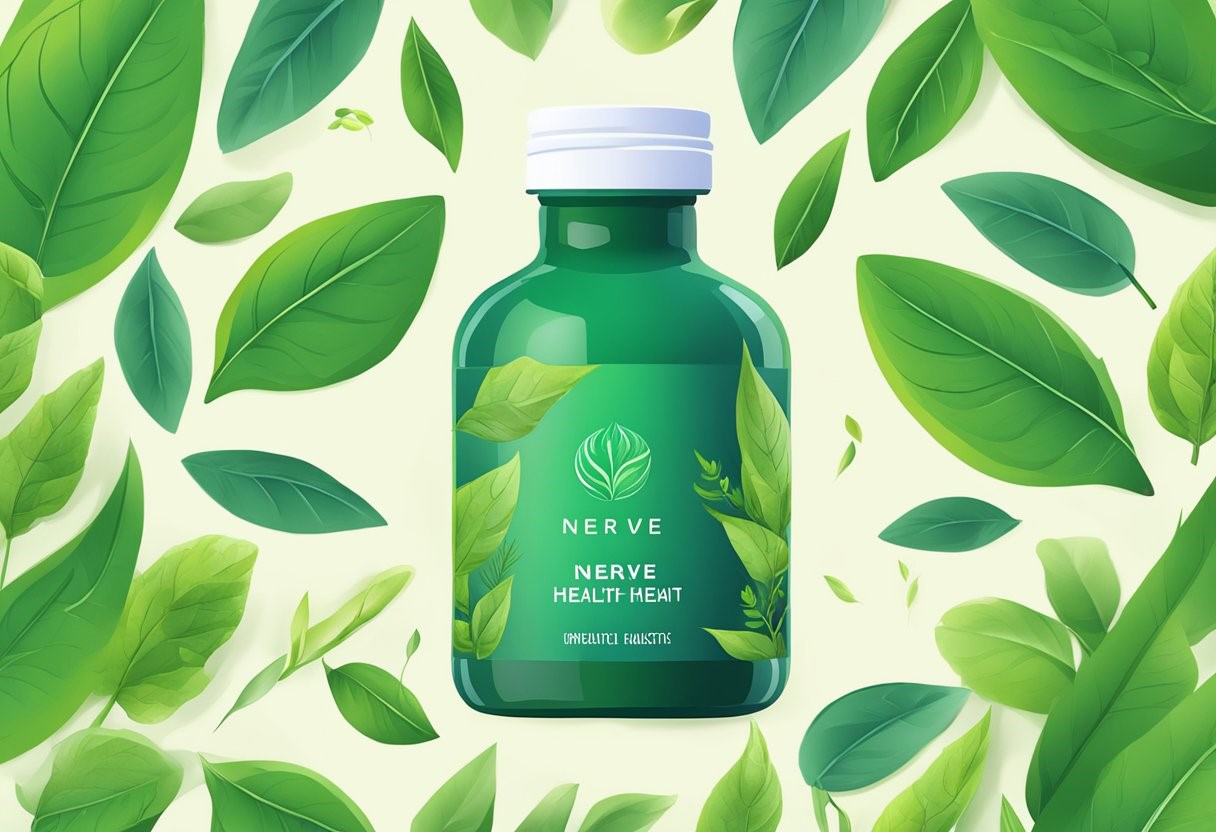









Free Shipping (WM) | Sign Up Biobay Membership for Free 50 Points & Exclusive Benefits
Nerve pain can be a debilitating condition that affects your daily life. Many people are turning to dietary supplements as a potential way to manage their symptoms. B vitamins, alpha-lipoic acid, and curcumin(Nofollow) are among the supplements that may help reduce nerve pain and improve nerve function. While these supplements show promise, it's important to approach them with caution. Not all supplements are created equal, and what works for one person may not work for another. It's crucial to consult with your healthcare provider before starting any new supplement regimen, especially if you're taking other medications. Understanding the potential benefits and risks of supplements for nerve pain can help you make informed decisions about your health. Let's explore some of the most popular options and what the science says about their effectiveness.

Your nerves play a crucial role in your body's functioning. They transmit signals between your brain and the rest of your body, allowing you to move, feel, and respond to your environment.
Healthy nerves are essential for a good quality of life. When your nerves are in top shape, you can:
- Move freely without pain
- Feel sensations accurately
- Maintain proper balance and coordination
- React quickly to stimuli
Nerve pain can significantly impact your daily activities. It may cause discomfort, limit your mobility, and affect your sleep. By prioritising nerve health, you can reduce the risk of developing such issues.
Your nerves need proper nutrition and care to function optimally. A balanced diet rich in vitamins and minerals supports nerve health. Regular exercise also helps maintain strong, healthy nerves.
Protecting your nerves from injury is vital. Avoid repetitive motions that could compress nerves, and take breaks during activities that strain your body. Proper posture can also prevent nerve compression.
If you experience persistent nerve pain, don't ignore it. Seek medical advice promptly. Early intervention can often lead to better outcomes and more effective pain relief.
Remember, maintaining nerve health is an ongoing process. By taking care of your nerves, you're investing in your overall wellbeing and comfort.

Dietary supplements may help ease nerve pain. Many people with neuropathy have nutrient deficiencies that can make symptoms worse. Taking certain vitamins and minerals could fill these gaps.
Some common supplements for nerve pain include:
- Vitamin B complex
- Vitamin D
- Magnesium
- Zinc
- Alpha-lipoic acid
These natural ingredients work in different ways. Some reduce inflammation. Others support nerve health directly. You may need to try a few to find what works best for you.
It's important to talk to your doctor before starting any new supplements. They can interact with medicines or cause side effects. Your doctor can also test for specific deficiencies.
Remember that supplements aren't a cure-all. They work best as part of a complete treatment plan. This might include diet changes, exercise, and other therapies your doctor recommends.
Quality matters when choosing supplements. Look for products from reputable brands. Third-party testing can help ensure purity and potency. Always follow the dosage instructions on the label.

Several supplements can help support nerve health and reduce symptoms of neuropathy. These include vitamins, amino acids, and natural compounds that may improve nerve function and reduce pain.
Vitamin B complex is crucial for nerve health. It includes B1 (thiamine), B6, and B12 (cobalamin). These vitamins play a vital role in maintaining healthy nerves and reducing neuropathic symptoms.
B1 aids in the functioning of nerves. B6 helps in the synthesis of neurotransmitters. B12 plays a significant role in nerve repair and regeneration. However, use caution with vitamin B6 doses: avoid taking more than 200 mg per day, as excessive amounts may cause or worsen neuropathic symptoms.
A deficiency in these vitamins leads to damage of the nerves and heightens the symptoms of neuropathy. However, the use of supplementation with a B-complex could reduce tingling, numbness, and all kinds of burning sensations that come with neuropathy.
For diabetic neuropathy, benfotiamine (a form of B1) may be particularly helpful. It can improve nerve function and reduce pain in people with diabetes.
Acetyl-L-carnitine (ALC) is an amino acid that plays a crucial role in energy production within cells. It may help improve nerve function and reduce neuropathic pain.
ALC has been shown to:
- Promote nerve fibre regeneration
- Improve nerve conduction velocity
- Reduce pain and numbness in peripheral neuropathy
Studies suggest ALC may be particularly beneficial for diabetic neuropathy. It can help improve insulin sensitivity and reduce oxidative stress, which contributes to nerve damage in diabetes.
The typical dosage ranges from 500 to 2,000 mg per day. However, you should consult your doctor before starting any new supplement regimen.
Magnesium is a mineral that plays a crucial role in nerve function and pain perception. It helps regulate neurotransmitters and can reduce nerve pain sensitivity.
Low magnesium levels have been linked to an increased risk of neuropathy, especially in people with diabetes. Supplementing with magnesium may help:
- Reduce nerve pain and inflammation
- Improve nerve function
- Enhance insulin sensitivity in diabetic neuropathy
Magnesium comes in various forms, including magnesium glycinate, citrate, and oxide. Glycinate and citrate are generally better absorbed than oxide.
The recommended daily allowance for magnesium is 300-400 mg for adults. However, your doctor may recommend higher doses for neuropathy treatment.
Curcumin, the active compound in turmeric, has powerful anti-inflammatory and antioxidant properties. It may help reduce nerve pain and improve nerve function in people with neuropathy.
Studies have shown that curcumin can:
- Reduce inflammation in peripheral nerves
- Protect against oxidative stress that damages nerves
- Improve nerve conduction velocity
Curcumin may be particularly helpful for diabetic neuropathy. It can help regulate blood sugar levels and reduce oxidative stress associated with diabetes.
To improve absorption, look for curcumin supplements that include black pepper extract (piperine). The typical dosage ranges from 500 to 2,000 mg per day.
NAC is an antioxidant amino acid that may help reduce inflammation and protect nerves from damage. While research in humans is limited, one study found that doses of 1,200 to 2,400 mg per day could significantly reduce neuropathic pain. NAC supports glutathione production, a critical antioxidant for nerve health, and may slow progression of nerve damage, particularly in diabetic neuropathy.
Fish oil’s anti-inflammatory properties and role in cell membrane health make it a potential nerve pain supplement. Omega-3s can support nerve regeneration and may help relieve muscle soreness and discomfort associated with neuropathic conditions. Foods like salmon, sardines, and walnuts are good sources. If you opt for supplements, follow dosage guidelines and talk to your doctor.

Research on supplements for nerve pain shows mixed results. Some studies find benefits, while others are inconclusive. The quality of evidence varies widely across different supplements.
Several studies have looked at supplements for neuropathic pain. Most are small trials or animal studies. Few large, high-quality trials exist.
Some of the studies concern chemotherapy-induced neuropathy. This is one of the side effects that leads to aching of the nerves Trials have used vitamins, herbs, and other supplements to soothe this pain.
Other studies look at nerve pain caused by a variety of other factors, including diabetes, shingles, and injuries. For reviews of the most common supplements studied for neuropathy, see B vitamins, alpha-lipoic acid, and fish oil.
Vitamin B12 shows promise for some types of nerve pain. One review found it may help with pain after shingles. It might also ease diabetic nerve pain.
Alpha-lipoic acid has mixed results. Some studies show it helps diabetic nerve pain. Others find no effect.
Fish oil may reduce inflammation. This could help some types of nerve pain. But more research is needed.
Results vary a lot between studies. This makes it hard to draw firm conclusions. Several factors cause this:
- Small sample sizes in many trials
- Different types of nerve pain studied
- Varying doses and forms of supplements used
- Short study lengths in some cases
Study quality is often low. Many lack proper controls or blinding. This can lead to biased results.
Some trials don't account for other treatments patients use. This can skew the findings.
More high-quality research is needed. Large, well-designed trials would give clearer answers about these supplements.

Supplements can help ease nerve pain through various processes in the body. They work by targeting inflammation, oxidative stress, and nerve function directly.
Certain supplements play a key role in nerve health. B vitamins are crucial for maintaining a healthy nervous system. They help produce myelin, the protective covering around nerves. This aids in proper nerve signalling.
Alpha-lipoic acid is another important supplement. It helps lower blood sugar levels. High blood sugar can damage nerves over time. By keeping it in check, you reduce the risk of nerve pain.
Magnesium supports nerve function, too. It helps regulate calcium levels in nerve cells. This is vital for proper nerve signalling and pain control.
Many supplements for nerve pain work as antioxidants. They fight oxidative stress, which can damage nerves. Vitamin C and E are common antioxidant supplements.
Glutathione is a powerful antioxidant your body makes. Some supplements boost its production. This helps protect nerves from damage.
Anti-inflammatory supplements also play a big part. Curcumin, found in turmeric, has strong anti-inflammatory effects. It can help reduce nerve pain caused by inflammation.
Omega-3 fatty acids are another key player. They help lower inflammation throughout the body, including in nerves.

Taking supplements for nerve pain requires careful consideration. Proper usage and awareness of potential risks are key to maximising benefits whilst minimising harm.
Supplements for nerve pain can cause unwanted effects. Alpha-lipoic acid may lead to skin rashes or stomach upset. B vitamins might cause nausea or diarrhoea.
Calcium supplements can interfere with certain medications. High doses of vitamin E may increase bleeding risk. Ibuprofen can cause stomach irritation.
CBD might cause drowsiness or changes in appetite. Capsaicin creams often cause burning sensations on the skin.
Always consult your doctor before starting any new supplement, especially if you take other medications.
Follow dosage instructions carefully. Start with low doses and increase gradually.
Take vitamin D with food to improve absorption. Calcium is best absorbed in smaller doses throughout the day.
Avoid taking ibuprofen or aspirin on an empty stomach. Use acetaminophen as directed to prevent liver damage.
Apply capsaicin creams sparingly and wash hands thoroughly after use. When using CBD, choose reputable products and start with low concentrations.
Monitor your body's response. If you experience any adverse effects, stop use and consult your healthcare provider.
Combine supplements with lifestyle changes for best results. Regular exercise and physical activity can improve nerve function and reduce pain.
Include vitamin-rich foods in your diet. Leafy greens provide B vitamins, while fatty fish offer omega-3s.
Consider complementary therapies like acupuncture or physical therapy. Meditation can help manage pain perception.
Stay consistent with your supplement routine. Set reminders or use pill organisers to maintain daily doses.
Monitor your progress. Keep a journal to track symptoms and improvements. Adjust your regimen as needed with guidance from your healthcare provider.
Remember, supplements are not a replacement for medical treatment. Always work with your doctor to develop a comprehensive plan for managing nerve pain.
Supplements may offer relief for nerve pain, but it's crucial to understand their effects and use them wisely. Let's review the key points about supplements for nerve pain.
Several supplements show promise for easing nerve pain. B vitamins, especially B12, can help regenerate nerves. This may improve nerve function and reduce pain. Fish oil, curcumin, and antioxidants might also help. They can lower inflammation and protect nerves from damage.
Some people find relief with St. John's Wort, zinc, or magnesium. These may ease pain and boost your mood. Remember, the strength of evidence varies for each supplement. What works for one person might not work for another.
If you're interested in exploring options for nerve pain relief or other consumer healthcare products, Biobay offers a range of high-quality supplements designed to support overall well-being. We encourage you to review our selection to find products that may align with your health goals.
No, dietary supplements should complement, not replace, medications prescribed by your healthcare provider. Always consult your doctor before making changes to your treatment plan.
The effectiveness of supplements varies. Some may show results within weeks, while others could take months. Consistency and the severity of the condition play a significant role.
While some supplements can be combined, there is a risk of overconsumption or interactions. Consult a healthcare professional to create a safe regimen.
Some supplements like alpha-lipoic acid may cause stomach upset, while high doses of Vitamin B6 could lead to nerve damage over time. Always follow recommended dosages.
Alpha-lipoic acid, Vitamin B12, and curcumin have shown promise in alleviating symptoms of diabetic neuropathy. However, speak to your doctor for personalised advice.
